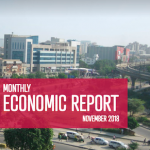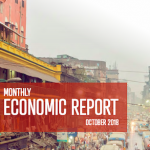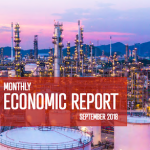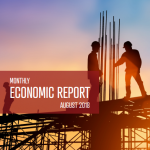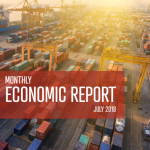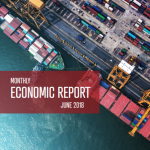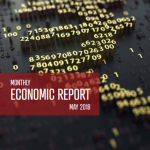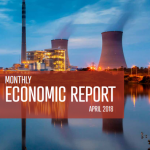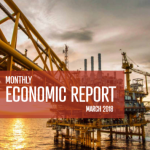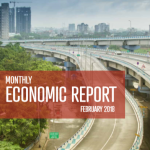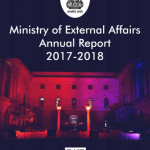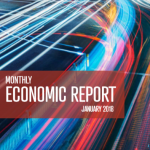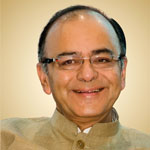-

Economic Report (November 2018)
The growth of India’s real gross domestic product (GDP) for the first half of 2018-19 was 7.6 per cent, as compared with growth of 6 per cent in the first half of 2017-18. The growth of GDP at constant prices for the second quarter of 2018-19 was 7.1 per cent, as compared with 6.3 per cent a year earlier.
-

Economic Report (October 2018)
The growth of India’s gross domestic product (GDP) at constant prices for the first quarter of the financial year 2018-19 was 8.2 per cent, reinforcing the upswing trend started since the second quarter of 2017-18. As a result, India’s US$2.6-trillion economy is estimated to grow by as much as 7.5 per cent over the financial year ending March 31 2019.
-

Economic Report (September 2018)
The value of merchandise exports declined by 2.2 per cent, while imports increased by 10.5 per cent in September 2018 over September 2017. The nation’s foreign exchange reserves stood at US$400.5 billion as of end-September and US$393.5 billion as of October 19, 2018.
-

Economic Report (August 2018)
The value of merchandise exports and imports increased by 19.2 per cent and 25.4 per cent, respectively, in August 2018 over August 2017..
-

Economic Report (July 2018)
The growth of India’s gross domestic product (GDP) at constant prices for the first quarter of financial year 2018-19 was 8.2 per cent, reinforcing the upswing trend started since second quarter of 2017-18.
-

Economic Report (June 2018)
India’s US$2.5 trillion economy is estimated to grow by 6.7 per cent over the financial year ending March 31 2018.
-

Economic Report (May 2018)
The growth of India’s gross domestic product (GDP) at constant prices for the fourth quarter of financial year 2017-18 was recorded at 7.7 per cent, which is higher as compared with the growth registered in previous six quarters.
-

Economic Report (April 2018)
The production of eight crore infrastructure industries grew by 4.1 per cent in March 2018, as compared with 5.2 per cent in March 2017.
-

Economic Report (March 2018)
India’s gross domestic product (GDP) growth at constant prices was recorded at 7.2 per cent during the third quarter of financial year 2017-18. This was higher than the growth registered in previous four quarters..
-

India Economic Outlook 2018 (Deloitte)
India’s economic outlook was promising for financial year 2017-18 and is expected to strengthen further in financial year 2018-19.
-

Economic Report (February 2018)
The Index of Industrial Production (IIP) grew by 7.5 per cent in January 2018, as compared with a growth of 3.5 per cent in January 2017.
-

MEA Annual Report 2017-18
The year 2017-18 saw the continuation of an outcome-oriented foreign policy, aimed at achieving the key goals of ensuring national security and upholding territorial integrity, attaining national economic transformation, and addressing regional and global issues. This approach was reflected in the revitalisation of India’s traditional ties, in energised strategic and commercial relations, along with continued engagement of the Indian diaspora.
-

Economic Report (January 2018)
At the sectoral level, agriculture, industry and services sectors grew at the rate of 3.0 per cent, 4.8 per cent and 8.3 per cent, respectively, in 2017-18.
-

Highlights of Union Budget 2018-19
India’s Finance Minister Shri Arun Jaitley presented the Union Budget for financial year 2018-19 in the Parliament on February 1st, 2018. The transformative budget is guided by a mission to strengthen the agriculture, rural, health, education, employment and infrastructure sectors, along with boosting micro, small and medium enterprises. The proposed structural reforms and projects have opened up exciting new opportunities for foreign entities.
-

Finance Minister Arun Jaitley’s 2018-19 Union Budget Speech
India’s Finance Minister Shri Arun Jaitley presented the Union Budget for financial year 2018-19 in the Parliament on February 1st, 2018. The transformative budget is guided by a mission to strengthen the agriculture, rural development, health, education, employment and infrastructure sectors, along with boosting micro, small and medium enterprises. The Government is confident that a series of structural reforms will propel India among the fastest growing economies of the world. India’s economy is firmly on course to achieve over 8 per cent growth with manufacturing, services and exports back on good growth path.
